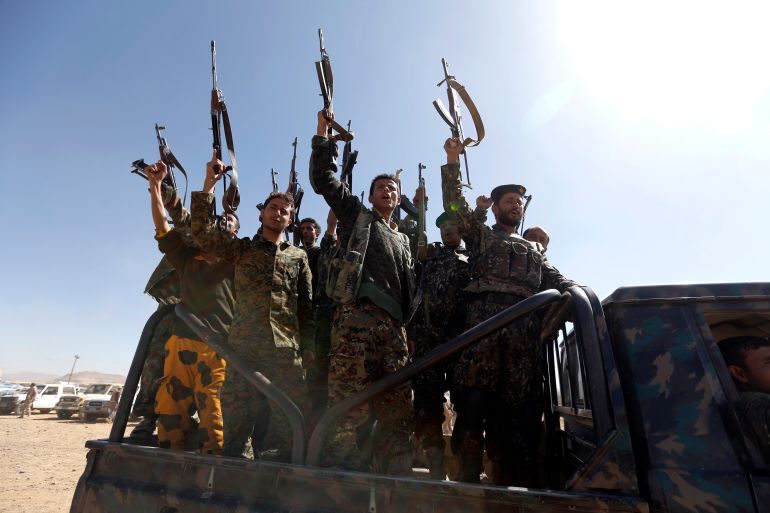What is behind the rise in Saudi-Houthi tit-for-tat attacks?
The Yemeni group and Saudi Arabia have been engaged in tit-for-tat attacks amid renewed US efforts to end the conflict.

Yemen’s Houthi movement and Saudi Arabia have been engaged in tit-for-tat attacks for years, with the Iran-aligned rebels intensifying missile and drone attacks in the past several weeks.
On Monday, the Houthis targeted the heart of a Saudi oil installation in its eastern province, pushing global crude oil prices to the highest level in two years.
Keep reading
list of 3 itemsYemen’s Houthi rebels claim missile attack on Saudi oil facility
Saudi-led coalition launches air raids on Yemen’s Sanaa
The latest escalation comes amid renewed diplomatic efforts by the United States and the United Nations to reach a ceasefire that would pave the way for a resumption of UN-sponsored political talks to end the six-year conflict in Yemen.
The Houthis have defended the cross-border attacks, saying they are in response to six years of a devastating military offensive in Yemen by a Saudi-led coalition.
The Saudi-led coalition aims to restore Yemen’s internationally recognised government, to stem what it perceives as Iran’s growing influence in the region.
Rights groups and international observers have criticised the Saudi-led war that has killed tens of thousands of people, displaced millions and pushed the Middle East’s poorest nation towards an unprecedented humanitarian crisis.
When did the escalation begin?
The Houthis stepped up cross-border missile and drone attacks on Saudi targets in February after US President Joe Biden halted support to Saudi offensive operations in Yemen’s war. Washington said, however, that it would continue to help Riyadh defend itself from regional threats.
Washington also reversed a decision by former President Donald Trump to put Houthis on a “terror list”.
The Houthis have also clashed with Saudi-backed Yemeni government forces this month in the strategic northern province of Marib as they intensified a campaign to capture the country’s richest oil fields.
What are the Houthis’ targeting?
Houthi cross-border missile and drone attacks have mostly targeted southern Saudi cities as well as the kingdom’s oil industry in some cases.
The Saudi oil giant, Aramco, has been a frequent target, with the most serious attack in recent years being in September 2019, when Saudi Arabia was forced to temporarily shut down more than half of its crude output, causing disarray in the global oil supply.
More recently, on March 4, the Houthis said they had fired a missile at an Aramco petroleum products distribution plant in the Red Sea city of Jeddah. There was no confirmation from the Saudi authorities or the company.
Prior to that, the last confirmed attack on an Aramco facility was in November.
Why did the Houthis step up their attacks?
The Saudi-led coalition said in a statement the Houthis had been “encouraged [the group] to go too far in launching armed drones and ballistic missiles towards civilians in Yemen and Saudi Arabia” after the new US administration revoked Trump’s “terrorist” designation.
It added that coalition “victories” in the Yemeni region of Marib had also prompted the rebels to step up their attacks inside the kingdom.
Speaking from Doha, Al Jazeera’s Hashem Ahelbarra said there were two things at play.
“The Houthis are saying that they are responding to the latest escalation in the area with intense Saudi-led coalition strikes targeting Houthi positions in Sanaa.
“At the same time, by the end of this month, we will be commemorating the sixth anniversary of the Saudi-led coalition against the Houthis.
“The attack yesterday, deeper into Saudi Arabia, targeting vital refineries … is a message by the Houthis that they are far from being defeated and that they will continue to gain ground and expand their military influence,” he said.
What next?
The developments mark a new escalation in Yemen’s six-year conflict as the Houthis battle the Saudi-led military coalition.
Al Jazeera’s Ahelbarra said the recent attacks “place huge pressure on Saudi Arabia” and might push the kingdom to “step up its military campaign in the coming days to try to retaliate”.
“But that is unlikely to lead anywhere because the indication on the ground is that Houthis are making significant military gains,” he added.
Meanwhile, he said the Houthi’s launch of “an extraordinary attack to take over the Marib province” was another front likely to witness more clashes.
“If the Houthis manage to take over Marib, it might mean the beginning of the end for the internationally recognised [Yemeni] government,” said Ahelbarra.